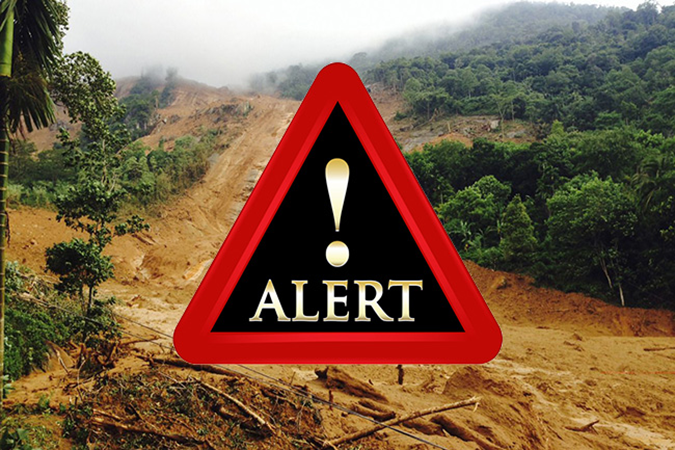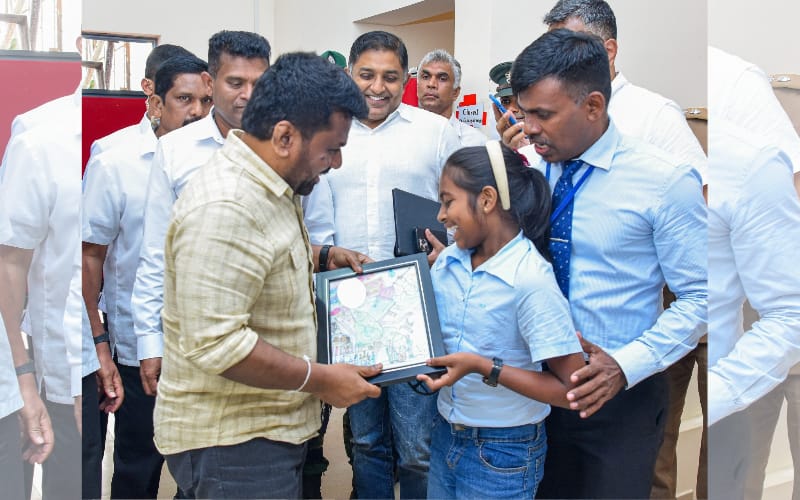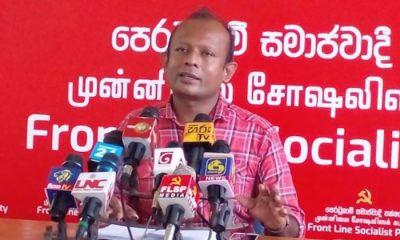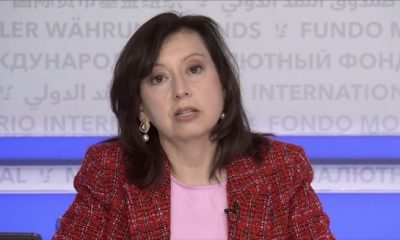News
IMF says addressing corruption key aspect of its programme for SL

CPC, CEB need to recover costs until end of Fund’s loan package
By Rathindra Kuruwita
The Ceylon Petroleum Corporation (CPC) and Ceylon Electricity Board (CEB) had to recover costs until the end of the IMF programme, Sarwat Jahan, IMF Resident Representative in Sri Lanka, told a press conference in Colombo yesterday.
The IMF also wanted the government to restructure the balance sheets of a number of other State Owned Enterprises (SOEs), Jahan said, adding that the IMF was concerned about the impact of the programme on the most vulnerable people and it had asked the government to have social security floors to ensure that their welfare is met.
“The amount of money that can be allocated depends on the fiscal space it has. As it is 0.6 percent of the GDP can be allocated for social security. This can be increased when the economic situation improves,” she said.
IMF Director of Asia and Pacific Department Krishna Srinivasan said that Sri Lanka would be subjected to a country diagnostic exercise and that addressing corruption was a key aspect of this programme. “Sri Lanka came to us for this program. This shows that they have recognized that corruption is a serious issue. Sri Lanka has carried a number of prior actions before the agreement was signed with the IMF and that shows Sri Lanka is committed to the reforms process,” he said.
Given below is the opening remarks by Krishna Srinivasan.
“I am here in Colombo—my first visit to Sri Lanka—to further strengthen the IMF’s engagement with a broad spectrum of stakeholders in the country. In addition to meeting with the President and top leadership of the country, I have been able to engage with members of the opposition, civil society organizations, trade unions, think tanks, and other stakeholders. An IMF staff team, led by Peter Breuer, is also currently in Sri Lanka and will be here until May 23 for regular consultations ahead of the first review mission later this year. The team will communicate further with you at the end of its visit.
“To put things in perspective, before I talk about Sri Lanka, let me offer a few thoughts on the global and regional outlook.
“2023 looks to be a challenging year for the global economy. Global growth is expected to decelerate and bottom out in 2023, as rising interest rates and Russia’s war in Ukraine weigh on activity. Global inflation is easing but remains stubbornly high. And banking strains in the U.S. and Europe have injected greater uncertainty into an already complex landscape.
Against this uncertain global backdrop, Asia-Pacific remains a dynamic region. Despite weakening external demand and monetary tightening across major economies around the world, domestic demand has so far remained strong. Growth in Asia and the Pacific is projected to increase this year to 4.6 percent, up from 3.8 percent in 2022. As a result, the region would contribute around 70 percent to global growth. Asia’s dynamism will be driven primarily by the recovery in China and resilient growth in India, while growth in the rest of Asia is expected to bottom out in 2023, in line with other regions.
“This dynamic outlook, however, does not imply that policymakers in the region can afford to be complacent. Headline inflation has been easing, but remains above targets in most countries, while core inflation has proven to be sticky. Although spillovers from turmoil in the European and US banking sectors have been limited thus far, vulnerabilities to global financial tightening and volatile market conditions, especially in the corporate and household sectors, remain elevated. Growth in the region is expected to fall to 3.9 percent five years out, the lowest medium-term forecast in recent history, reflecting a combination of factors, including an aging population, falling productivity, and scarring from the pandemic.
Risks to the outlook are to the downside, owing to the possibility of stickier global and regional price pressures, the disconnect between market views regarding the monetary policy path in advanced economies and what is being communicated by their central banks, the possibility of additional turmoil in global financial markets, adverse spillovers to the region from China’s medium-term growth slowdown, and deeper geo-economic fragmentation.
“What does this challenging global environment mean for Sri Lanka?
Sri Lanka, as you know, has been facing a severe crisis because of past policy missteps and back-to-back economic shocks. We have been deeply concerned about the impact of the crisis on the Sri Lankan people, particularly the poor and vulnerable groups, and about the economic costs of the delay in the country’s access to external financing.
“On March 20, the IMF Executive Board approved a 48-month Extended Fund Facility of about 3 billion U.S. dollars to support Sri Lanka’s economic policies and reforms. This marked an important step towards the resolution of the crisis. Sri Lanka immediately received an initial disbursement of about $330 million from the EFF arrangement, which is expected to catalyze new external financial including from the Asian Development Bank and the World Bank. Given the weak external environment and domestic policy tightening, aimed at restoring macroeconomic stability, the economy is expected to contract by 3 percent in 2023, before registering a modest growth of 1.5 percent in 2024. Prospects hinge quite critically on the implementation of the economic reform program.
“As you know well by now, the reform program supported under the EFF arrangement is built on strong policy measures and prioritizes five key pillars.
“First, an ambitious revenue-based fiscal consolidation,which is accompanied by stronger social safety nets, fiscal institutional reforms, and cost recovery-based energy pricing to ensure the state’s ability to support all its essential expenditures.
“Second, restoration of public debt sustainability including through a debt restructuring to ensure stable financing of the government’s operations.
Third, a multi-pronged strategy to restore price stability and rebuild reserves under greater exchange rate flexibility to alleviate the burden of inflation, particularly on the poor, to foster an environment of investment and growth, and to ensure Sri Lanka’s ability to purchase essential goods from abroad.
“Fourth, policies to safeguard financial sector stability, to ensure that the financial sector can play its key role in supporting economic growth.
“And fifth, structural reforms to address corruption vulnerabilities and enhance growth. Anti-corruption and governance reforms are imperative to ensure the hard-won gains from the reforms benefit the Sri Lankan people. Sri Lanka is the first country in Asia that has undergone the IMF governance diagnostic exercise. The IMF governance diagnostic report is expected to be published by September this year—the mission visited Colombo in March and engaged closely with stakeholders and civil society organizations on this critical reform area. We look forward to further discussion with them.
“Commendably, Sri Lanka has already started implementing many of the challenging policy actions in these five areas. It is now essential to continue the reform momentum under strong ownership by the authorities and the Sri Lankan people, more broadly.
“Economic impact of the reforms on the poor and vulnerable needs to be mitigated with appropriate measures. In this regard, we welcome the authorities’ firm commitment to strengthen social safety nets, including through a minimum spending floor, well-targeted spending through the new social registry and establishment of objective eligibility criteria.
“Let me conclude by saying that the IMF supported program is an opportunity for all Sri Lankans to come together to work through this crisis to restore economic stability and put the country on a sustainable growth path. The key is implementation. The IMF is here to help you along the way.”
Latest News
Landslide early warnings in force in the Districts of Badulla, Kandy, Kegalle, Kurunegala, Matale, Nuwara Eliya and Ratnapura

The Landslide Early Warning Center of the National Building Research Organisation [NBRO] has issued landslide early warnings to the Districts of Badulla, Kandy, Kegalle, Kurunegala, Matale, Nuwara Eliya and Ratnapura valid until 1600hrs on 14th December 2025.
Accordingly,
LEVEL III RED warnings are in force in the Divisional Secretaries Divisions and surrounding areas of Ududumbara, Medadumbara, Ganga Ihala Korale, Pathadumbara, Panvila, Udapalatha, Doluwa, Deltota and Minipe in the Kandy district, and Rideegama in the Kurunegala district.
LEVEL II AMBER warnings are in force in the Divisional Secretaries Divisions and surrounding areas of Uva Paranagama, Passara, Welimada, Haputhale, Lunugala, Soranathota, Ella, Kandeketiya, Bandarawela, Meegahakivula, Badulla, Hali_Ela and Haldummulla in the Badulla district, Harispattuwa, Pathahewaheta, Thumpane, Udunuwara, Poojapitiya, Hatharaliyadda, Gangawata Korale, Yatinuwara, Kundasale, Akurana and Pasbage Korale in the Kandy district, Rambukkana, Yatiyanthota, Aranayaka, Kegalle, Bulathkohupitiya, Mawanella, Warakapola and Galigamuwa in the Kegalle district, Polgahawela, Mallawapitiya, Alawwa and Mawathagama in the Kurunegala district, Ukuwela, Naula, Wilgamuwa, Matale, Laggala Pallegama, Rattota, Ambanganga Korale, Yatawatta and Pallepola in the Matale district, Walapane, Hanguranketha, Nuwara Eliya, Kothmale East, Mathurata, Nildandahinna, Thalawakele, Norwood, Kothmale West and Ambagamuwa Korale in the Nuwara Eliya district, and Kahawaththa, Kolonna and Godakawela in the Ratnapura district.
LEVEL I YELLOW warnings are in force in the Divisional Secretaries Divisions and surrounding areas of Dehiowita, Deraniyagala and Ruwanwella in the Kegalle district, and Kalawana, Kuruwita, Elapatha, Ayagama, Kiriella, Balangoda, Openayake, Imbulpe, Ratnapura, Kaltota, Eheliyagoda, Pelmadulla and Nivithigala in the Ratnapura district.
News
The rights of the fishing community will never be compromised – President

President Anura Kumara Dissanayake affirmed that the Government will never allow the violation of the rights of the fishing community, emphasizing the State’s firm commitment to protecting both land resources and the coastline.
The President also stated that the Government will address the challenges faced by fishing communities across the country through discussion and constructive engagement, ensuring sustainable solutions while safeguarding livelihoods.
President Anura Kumara Dissanayake made these remarks while attending a Special District Coordination Committee Meeting held on Saturday (13) afternoon at the Mannar District Secretariat, convened to review on-going efforts to restore normalcy to public life and rehabilitate infrastructure in the Mannar District following the recent disaster.
Highlighting the urgent need for a permanent solution to flooding in the Mannar District, the President instructed officials to proceed with the proposed flood control project after conducting comprehensive studies to ensure its long-term effectiveness.
Special attention was drawn to the severe impact of the disaster on the fishing sector. It was revealed that approximately 12,000 fishermen are currently unable to engage in fishing activities due to flooding and adverse weather conditions.
The President directed that dry ration packs be provided for one week to fishing families who, although not directly affected by floods, have lost their livelihoods due to unfavourable weather conditions.
Additionally, discussions were held on engaging with the Chinese Embassy to distribute a stock of fishing gear donated by the Government of China to fishermen affected by the disaster.
Attention was also focused on illegal land encroachments within the water catchment area of the Yodha Wewa Sanctuary. The President instructed that strict legal action be taken against individuals obstructing the placement of boundary markers around the reservoir.
It was reported that 70 families in the Mannar District have lost their homes due to the disaster. Discussions were held on rebuilding these houses and identifying suitable land for resettlement. A committee will be appointed to identify the required land within the next two weeks.
The meeting also addressed the expansion of facilities at Mannar Base Hospital and other hospitals, along with restoring health services and normalizing educational activities in the district.
The President further instructed that the Rs. 15,000 assistance provided by the Treasury for schoolchildren be disbursed promptly through Divisional Secretaries, based on recommendations from Grama Niladhari officers.
Extensive discussions were also held on reconstruction of damaged roads and bridges, restoration of water and electricity supply, rehabilitation of irrigation systems, compensation for losses in agriculture and livestock sectors and supporting affected communities to restart their livelihoods without delay
The meeting was attended by Deputy Minister of Cooperative Development and Chairman of the Vanni District Coordination Committee Upali Samarasinghe, Northern Province Governor N. Vethanayahan, Members of Parliament S. Thilaganathan, M. Jegatheeswaran, T. Ravikaran, Sathiyalingam, Selvam Adaikkalanathan, Kader Mastan and Rishad Bathiudeen, along with other government and opposition parliamentarians.
Also present were the Secretary to the Ministry of Finance, Secretary to the Ministry of Defence, Northern Province Chief Secretary D. Murugesan, Mannar District Secretary K. Kanageswaran, senior government officials, and representatives of the security forces.
Latest News
Prioritize rebuilding the livelihoods of disaster-affected communities – President

President Anura Kumara Dissanayake has instructed officials to give top priority to restoring the livelihoods of communities affected by the disaster. He emphasized the need to expedite compensation payments for damages and to take immediate measures to revive the agriculture, fisheries and industrial sectors.
The President further directed that all compensation payments for crop damage be completed before December 25.
These instructions were issued during a special District Coordinating Committee meeting held on Saturday (13) morning at the Puttalam District Secretariat.
President Anura Kumara Dissanayake described the recent cyclone as one of the largest disasters the entire country has faced in recent times. He commended the dedicated efforts of the tri-forces, Police and public officials in restoring the lives of affected communities. The President noted that, thanks to their commitment, a significant portion of essential infrastructure including electricity, water supply and roads has already been rehabilitated.
He further emphasized that the Government’s ability to provide such substantial compensation to disaster-affected communities is the result of the strong fiscal discipline of the Government.
Taking into account the challenges that have arisen in the distribution of allowances and aid so far, the President instructed Divisional Secretaries to ensure that compensation is provided strictly to eligible recipients and to fully intervene to prevent any deviation from this policy under any circumstances.
During the meeting, the rehabilitation of damaged highways and bridges in the district was discussed in detail. The President inquired into issues arising during these reconstruction efforts and provided on-the-spot solutions in consultation with the relevant officials.
The construction of the Lower Kala Oya Bridge was also discussed. The President instructed that a temporary bridge be built to meet the needs of the tourism sector. He emphasized that all construction activities should be carried out with a thorough understanding of necessity and proper structural assessments.
The President further highlighted that previous large-scale projects were abandoned without delivering tangible benefits or the intended outcomes. He stressed that future infrastructure development should focus not only on regional needs but also on the broader economic benefits for the country as a whole.
The President inquired about the ongoing efforts to restore electricity supply in the district and emphasized the need to complete these works without delay.
He also reviewed measures being taken to re-establish water supply and instructed provincial authorities to intervene promptly, noting that current well cleaning efforts in the district are insufficient.
Regarding agriculture, the President inquired about preparations by local farmers for the upcoming Maha paddy cultivation. He directed officials to swiftly create a conducive environment for farming, minimize the amount of abandoned land and explore alternative methods to ensure productive use of farmland.
He instructed that all compensation due to farmers be disbursed before December 25, that payments be made regardless of whether the land is in reserves or legally protected areas, and that systematic measures be implemented to prevent cultivation on reserved lands.
The President also highlighted the need for comprehensive soil conservation programmes in areas such as Kalpitiya.
The President emphasized the need to provide fair compensation to those engaged in the livestock sector in order to restore their livelihoods. He also highlighted the importance of obtaining accurate ground-level data and stressed the necessity of introducing legislation to ensure the registration of all livestock farms.
Due to the disaster, 627 houses in the district were completely destroyed, and 20,813 houses sustained partial damage. The President instructed that compensation for the affected families be expedited, emphasizing priority resettlement on government land. Where government land is unavailable, he directed that Rs. 5 million be provided to each family for the purchase of alternative land.
For those whose houses were completely destroyed, the President directed that new housing projects be implemented in a manner that ensures ownership of a house valued at Rs. 5 million for each beneficiary.
Attention was also given to the fisheries sector. Discussions were held on providing assistance for the repair of damaged fishing boats, as well as implementing fair compensation and concessional bank loan schemes for prawn farmers.
President Dissanayake also inquired into the operations at Chilaw Hospital. Authorities informed him that patient admissions and the functioning of several units could resume by next week.
Minister of Public Administration, Provincial Councils, and Local Government and Chairman of the Puttalam District Coordination Committee Chandana Abeyratne, Deputy Minister of Environment Anton Jayakody, North Western Province Governor Tissa Warnasuriya, Government and Opposition Members of Parliament from Puttalam District, Local Government Representatives including the North Western Provincial Secretary, Secretary to the Ministry of Finance Dr. Harshana Suriyapperuma, Puttalam District Secretary, Divisional Secretaries, Government Officials, and Security Forces Representatives were present at the event.
-

 Features4 days ago
Features4 days agoFinally, Mahinda Yapa sets the record straight
-

 News6 days ago
News6 days agoOver 35,000 drug offenders nabbed in 36 days
-

 News5 days ago
News5 days agoCyclone Ditwah leaves Sri Lanka’s biodiversity in ruins: Top scientist warns of unseen ecological disaster
-

 News6 days ago
News6 days agoRising water level in Malwathu Oya triggers alert in Thanthirimale
-

 Features4 days ago
Features4 days agoHandunnetti and Colonial Shackles of English in Sri Lanka
-

 Business3 days ago
Business3 days agoCabinet approves establishment of two 50 MW wind power stations in Mullikulum, Mannar region
-

 Business6 days ago
Business6 days agoSri Lanka betting its tourism future on cold, hard numbers
-

 News6 days ago
News6 days agoJetstar to launch Australia’s only low-cost direct flights to Sri Lanka, with fares from just $315^

























